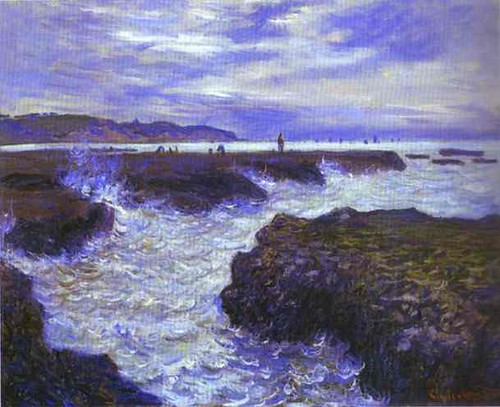
The Rocks near Pourville at Ebb Tide (1882)
by Claude Monet.
Click image for larger view in its own window.
This painting and this poem (below the fold) also seem to be made for each other.
This poem is one that I discovered several years after Gene Wilder first introduced me to it. When I was a wee one, I loved his delighful movie, Willy Wonka and the Chocolate Factory (1971) so much that I tape recorded it from the TV and played the tape often. (Surprisingly, after all my relocations, I still have that cassette tape). The dialogue in this particular scene made a huge impression;
Willy Wonka: The strawberries taste like strawberries. The snozzberries taste like snozzberries.
Veruca Salt: Snozzberries? Who ever heard of a snozzberry?
Willy Wonka: We are the music makers... and we are the dreamers of dreams.
It gave me the chills every time I heard Wilder say; We are the music makers and we are the dreamers of dreams. So I felt chills again when I first ran across Arthur O'Shaughnessy's poem several years later in the library, which I immediately fell in love with. Interestingly, O'Shaughnessy was a British Zoologist as well as a poet.
Ode
by Arthur O'Shaughnessy
We are the music makers,
And we are the dreamers of dreams,
Wandering by lone sea-breakers,
And sitting by desolate streams;--
World-losers and world-forsakers,
On whom the pale moon gleams:
Yet we are the movers and shakers
Of the world for ever, it seems.
With wonderful deathless ditties
We build up the world's great cities,
And out of a fabulous story
We fashion an empire's glory:
One man with a dream, at pleasure,
Shall go forth and conquer a crown;
And three with a new song's measure
Can trample a kingdom down.
We, in the ages lying
In the buried past of the earth,
Built Nineveh with our sighing,
And Babel itself in our mirth;
And o'erthrew them with prophesying
To the old of the new world's worth;
For each age is a dream that is dying,
Or one that is coming to birth.
A breath of our inspiration
Is the life of each generation;
A wondrous thing of our dreaming
Unearthly, impossible seeming--
The soldier, the king, and the peasant
Are working together in one,
Till our dream shall become their present,
And their work in the world be done.
They had no vision amazing
Of the goodly house they are raising;
They had no divine foreshowing
Of the land to which they are going:
But on one man's soul it hath broken,
A light that doth not depart;
And his look, or a word he hath spoken,
Wrought flame in another man's heart.
And therefore to-day is thrilling
With a past day's late fulfilling;
And the multitudes are enlisted
In the faith that their fathers resisted,
And, scorning the dream of to-morrow,
Are bringing to pass, as they may,
In the world, for its joy or its sorrow,
The dream that was scorned yesterday.
But we, with our dreaming and singing,
Ceaseless and sorrowless we!
The glory about us clinging
Of the glorious futures we see,
Our souls with high music ringing:
O men! it must ever be
That we dwell, in our dreaming and singing,
A little apart from ye.
For we are afar with the dawning
And the suns that are not yet high,
And out of the infinite morning
Intrepid you hear us cry--
How, spite of your human scorning,
Once more God's future draws nigh,
And already goes forth the warning
That ye of the past must die.
Great hail! we cry to the comers
From the dazzling unknown shore;
Bring us hither your sun and your summers;
And renew our world as of yore;
You shall teach us your song's new numbers,
And things that we dreamed not before:
Yea, in spite of a dreamer who slumbers,
And a singer who sings no more.
From Music and Moonlight (1874).
NOTE: Last five stanzas added after Pough mentioned that they were missing (My bad! I've never read the entire poem since most poetry volumes do not republish the entire thing. The book where it originally appeared is very expensive; costing something like $100).

Wandering by lonely sea-breakers? The painting does match the poem nicely. I was intrigued enough to google the poet and I found his Wiki entry interesting. It seems there are 9 stanzas in that poem and also that he was an Ichthyologist in the natural history department of the British Museum!
What could be cooler than a scientist/poet? (Apart from a scientist/poet with luxurious, flowing hair...)
Gene Wilder as Willy Wonka was my very first celebrity crush, at the age of 5. I was desperately in love.